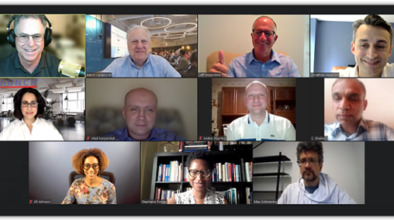Why Your Startup Needs an Advisory Board: Tips on When and How to Form One
The article “Why Your Startup Needs an Advisory Board: Tips on When and How to Form One “ by Loralyn Mears PhD first appeared on Grit Daily.
Over the past few months, there have been numerous pitch contests. Each one offers startups the opportunity to learn through the mistakes – and successes – of other entrepreneurs who have made a pitch. Although there are numerous tips offered related to the pitch itself, one aspect appears to be routinely overlooked: an Advisory Board. Prospective investors on the receiving end of the pitch frequently lament the non-existence, under-utilization or absence of advisors. The investment industry collectively understands that no business executive knows everything and applauds those who recognize that they can benefit from external guidance. So it’s hardly surprising that there is a lot of discussion about Boards, who to choose, how to become a Board member and how to terminate someone on your Board.
To this end, on November 14, 2019, in West Orange, NJ, a blended group of panelists was assembled by SoundBoard Venture Fund for a workshop on the role of Boards, as seen from both the perspective of a startup and a Board member. The objective was to gain insights on the roles and responsibilities of Board members, when and how to form a Board, and how to maximally leverage your Board members. The dynamic group was also encouraged to explore the pitfalls related to having a Board versus not having the right one. Grit Daily was on the scene to learn more.

On the importance of Boards
SoundBoard’s co-founder and managing partner, Jonathan Hakakian, opened the workshop with some commentary around the importance of collaborative analysis, a hallmark of how they manage their fund. Given that a relationship between an investor and startup has an average duration of seven years, but often up to ten years, Hakakian reiterated the importance of surrounding yourself with the people that will both challenge you and support you. It’s a balancing act that doesn’t work for everybody. Hakakian highlighted the importance of self-awareness. SoundBoard uses a multidimensional personality assessment to evaluate “fit” prior to making an investment in a startup. Behavioral dimensions include salesmanship, listening and other soft skills that can make all the difference in the success of the leadership team, the startup itself, the fund and the lending partners.
Panelists included one startup at an early stage and another preparing for exit, plus experts who are serving as Board members for non-profits, startups, global enterprise public companies and everything in between. Specifically, the participants were startup CEOs Joe Luttwak and Aliza Freud, plus Board members Olu Beck and Steve Levy. The discussion was expertly moderated by Amy Radin, who is also an active Board member. Grit Daily was in attendance to better understand the role of Boards vs. CEOs of startups and how they can work together most effectively towards the goal of mutual success.
The Panelists
Luttwalk, a serial entrepreneur and expert in the performance of hybrid composite materials, has recently founded his fourth startup, Lingrove. His team on-boarded its first investor and Advisory Board at the beginning of the year. They have developed “the structural material of the future” which uses 100% natural fibers mixed with resins and industrially-compostable materials that look like natural wood. However, like a veneer, it can be fluidly molded into any shape or design. And they do not off-gas. His tagline is brilliant and says it all, “We make wood without trees.”
Freud, a former fintech exec, is the CEO of SheSpeaks Inc. which just marked their 10th anniversary. Her company pivoted from a market research company once they realized how many women who joined their study panels were already blogging. The company had essentially taped into a large collection of micro-influencers but was handicapping them from discussing their participation in the studies. So they turned that around to harness it and now drive brand activation blogs, Twitter parties and develop influencer-led content for their clients.
Beck is a former executive at Mars and J&J with a law degree from the University of Oxford. Her CPG background has spurred invitations to multiple startups in the field as well as service to non-profits. She is a lending partner at SoundBoard and counsels companies within their portfolio.
Levy began his career at AT&T then went to Wall Street where he worked as an analyst for 20 years. There, he garnered tremendous experience facilitating 33 IPOs and countless M&A efforts. Since his retirement in 2005, he’s moved on as an Independent Director now serving on six corporate boards where two are publicly traded on Nasdaq. He’s been investing in startups since his Wall Street days began and also serves on non-profit Boards for organizations that he’s passionate about.
Radin describes herself as a “corporate survivor” who left C-suite roles five years ago after three decades on Wall Street and hasn’t looked back. She’s a published author and her book, “The Changemaker’s Playbook,” has recently been recommended as a “2019 business read.” Her thesis is that innovation is hard because people are resistant to change and her work is dedicated to helping businesses change to grow.
Best practices
First, it’s important to recognize the differences between an Advisory Board versus a Board of Directors. Startups can have both but the former is typical of an early-stage company where the latter is more typical of a late-stage company. The key difference is that an Advisory Board member provides guidance and does not have fiduciary responsibilities. In contrast, members of Boards of Directors are accountable to shareholders and have a dual mandate with the responsibility of both guidance and oversight. Advertisement
- All Board members should receive training such as the “Board 101” Directors’ Consortium program offered by Stanford University.
- Early-stage advisors can be family, friends or people that you are comfortable with and have the knowledge to help you get going.
- As you evolve, your advisors need to have networks that you can leverage for growth.
- It is natural and healthy to have Board members come in and out as your company evolves.
- The more money that you raise and earn through revenue growth, the more formalized that your Board will become and the fewer “friends” that will be serving on it.
- Founders often have blindspots and must come to terms with the fact that they do not know everything and that they will need help – but they need to be prepared to ask for it and accept the help they’re getting. Humility is an essential trait of effective leaders.
- Your Board members should have expertise in critical areas including your business domain, sales and marketing, and financial management.
- Within a startup, everything is amplified, be it the good or the bad, and determining where your business needs the most help is the critical first step in establishing the skillset that you need to have on your Board.
- Some companies deploy a Skills Matrix to assess the strengths and weaknesses of each Board member so that they can determine where they have gaps versus overlaps and use it to inform future appointments.
- Investors often request and/or demand a seat on your Board and this was met with mixed reviews given the risk of the “hen watching the henhouse” syndrome and how it’s best to keep operations independent of the direction of investors for as long as possible.
- Formal Agreements are required to engage your Board members as they will expect payments as a stipend or cash bonus, a share of the revenues or an equity stake (typically 0.25-2% depending on their level of participation which vests over the duration of the contract).
- Exiting a Board member requires negotiation and a legal transaction.
- Board members should commit to up to one hour per week plus leveraging their personal networks and startup executives have the responsibility of tightly defining and managing their Board members’ time effectively.
- Boards typically meet four times per year in person (and more if there is a crisis) but are optimally utilized through a monthly video conference call.
- Boards and startup executives need to “keep their eyes on the prize” and not be mired by the daily noise.
- Many Board of Director members begin their tenure with a startup in the capacity of an Advisory Board member until they have the confidence in the organization to assume fiduciary responsibility.
- Ethics and principles are highly personal so selecting Board members that mesh with your corporate culture is critical. How each member manages critical issues, their appetite for risk and their level of patience will vary widely so choose carefully.
- Do not chase “fast money” as it can result in an unwelcome Board addition which has the potential to toxify all the existing relationships. Find money that can “walk the journey with you.”
- Investors and Board of Directors members are renowned for the depth of due diligence that they conduct prior to formalizing their association with a startup. In contrast, founders do not perform enough due diligence but it is equally critical that they do.
- As startups prepare for exit, founders and their Boards must evaluate the benefits of a Strategic versus a Financial buyer which will be influenced by the founders’ emotional attachment to the business they created.
- Startups need hefty D&O insurance premiums given that Advisors of US companies can be litigated against so be sure to have protection.
There is no “one size fits all” approach to identifying the right Board members. However, as Hakakian frequently states, founders need to have high self-awareness to know when they need external help to move things forward. Clearly, the collaborative approach to investing in early-stage companies that reside outside the “usual suspects hot-spots for tech” is working as SoundBoard has already posted some signs of early success with their existing fund and is in the process of launching a second fund.
Grit Daily News is the top news source on Millennial and Gen Z brands — from fashion, tech, influencers, entrepreneurship, and life. Based in New York, our team is global and brings with it over 400 years of combined reporting experience. The champion of live journalism— including its own events in New York, Los Angeles, San Francisco, Toronto, Lisbon, Miami, and Tampa — Grit Daily’s team includes all stars and media veterans from ABC, CBS, CNN, Fast Company, Forbes, Inc., Vice, and Vox — among others.




